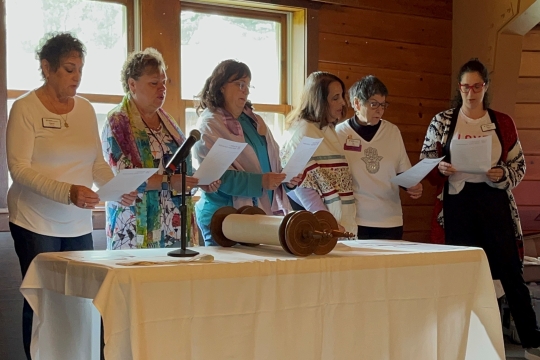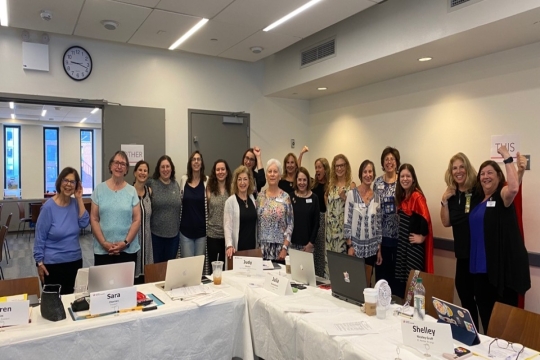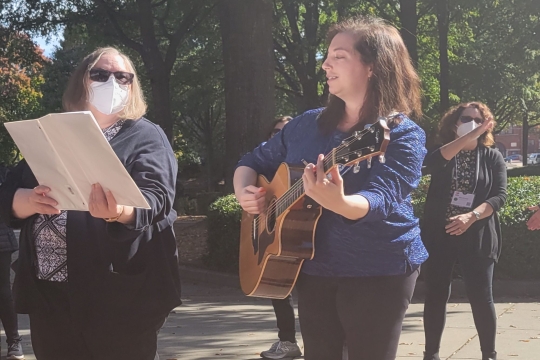
When I was younger, before the age of all our electronics, my Mom initiated me into the world of list-making. Each day was organized by my to-do list, and I took great satisfaction in checking off each item as it was completed. Most items were of a mundane nature, such as picking up a carton of milk on the way home from work. Some were of a higher priority and intent, such as completing an educational plan for a student in need of specialized services. At that time in my life, I would probably say that very few items on my checklist had anything to do with a spiritual nature, or a feeling of drawing closer to God. I took satisfaction in the ritual of making my daily list and in the crossing off tasks as I completed them. There was intention in my actions, but I rarely worried about the impact of my actions.
In this week’s Torah portion, Tsav, God commands Aaron and his sons to follow detailed instructions specific to the priests to make sure the sacrifices brought by the people will end up being pleasing to God. The word for sacrifice is Korban, “to come near,” and the priests were trusted to get it right for the sake of the people. After all, individuals were bringing the best of their best to the priests to offer to God on their behalf. It was very important that the priests got this right.
The instructions given to the priests spelled out how sacrifices should be made, the order in which specific sacrifices were to be made, and even told the priests what they should wear as they performed different aspects of their duties. Anything that touched the sacrifice had to be in a state of purity, including the priests, who were ordained, anointed, and initially purified by Moses, all following God’s instructions. Everything was done according to what I imagine to be a sacred checklist, ritualized to make sure no mistakes were made. If things were not done according to the intention of this instruction, the impact of missing the mark could bring dire consequences. Rashi explains that the Torah uses the emphatic expression, tzav, or “command,” to warn the priests to be especially careful in their service in the Mishkan.
After the temple’s destruction, Judaism replaced the sacrificial system. Prayer, study, and following the mitzvot were ways that individuals could draw nearer to God. Many of these actions became ritualized into the performance of time-bound mitzvot, most of which women were not obligated to perform. So, how could women’s voices be heard?
In The Torah: A Women’s Commentary, Nancy Fuchs Kreimer points out that one way women could participate in drawing closer to God was via the system of complex laws and rituals around preparing and eating food. For instance, when preparing braided bread for Shabbat, we take a small piece of dough called the challah, then burn it, representing the showbreads sacrificed at the temple. Now, we are pulling out our family recipes and preparing our homes for Pesach, a holiday celebrated with the ritual of seder, or order.
Due to COVID precautions, the days often seem to blend into one another. To combat disorder, I ritually use my calendar feature and program reminders on my phone to keep my daily routines going. In addition, I have chosen to add action items to my checklist that not only have intention, but also impact and meaning, as a way of practicing my Korban, or a way of drawing closer to God.
Women of Reform Judaism has provided us with opportunities to participate in meaningful actions which draw us closer to God. The Reproductive Health & Rights campaign spoke to many of us. Those of us living in Massachusetts spent hours combining forces to make our voices heard to expand access to abortion through the ROE Act. Many of us spent hours at the Joint Judiciary meeting to show our support and speak out in favor of the Act. We presented programming to our congregations to educate and inform as to why passage of the ROE Act was so important. We participated in lobbying our state representatives, and when the pandemic hit, we went virtual, continuing to contact our representatives and the governor. Our efforts (and prayers) were answered when our state legislature overrode the governor’s veto and provisions of the ROE Act were codified into state law.
There are many areas in which we can make an impact and make our voices heard. I encourage you to find something that speaks to you and add it to your to-do list! I wish all of you a Shabbat Shalom and a Zissen Pesach filled with ritual and joy.
Trina Novak is the Immediate Past President of Women of Reform Judaism Northeast District and a WRJ Board member. She is a past sisterhood president and member of the Sisterhood of Temple Beth Shalom in Needham, MA.
Related Posts

Parashat Yom Rishon shel Rosh HaShanah

Cultivating a Culture of Accountability and Belonging

